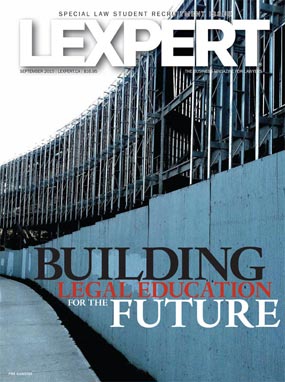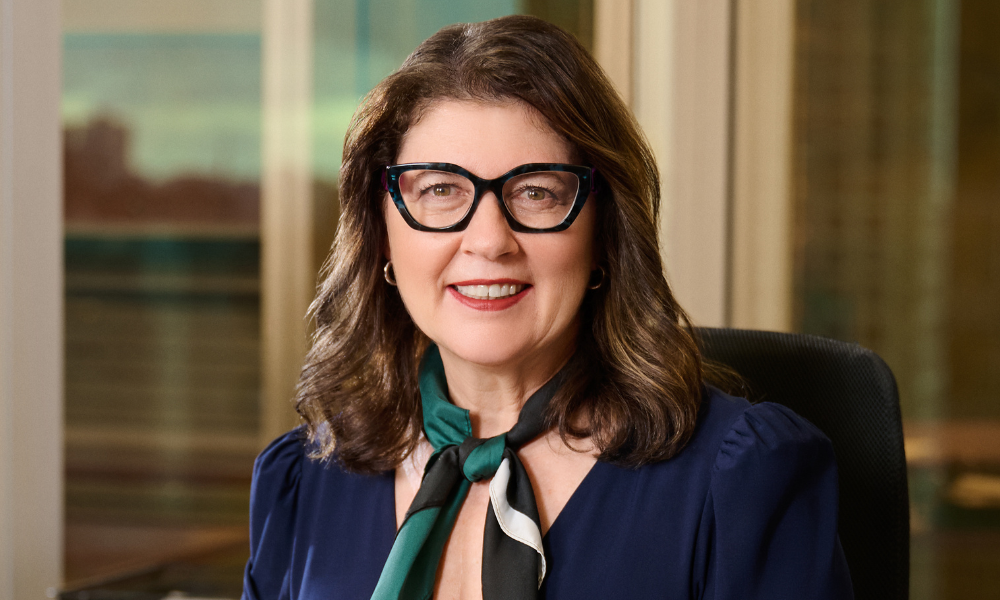Various legal education providers meet the challenges of offering curricula for future lawyers
Ask what business clients, or any clients for that matter, will need in the future and you will hear many responses, some of them new and some of them classic. Then you will be compelled to ask, how can we possibly train lawyers in all of these aspects in order to serve their clients? For every aspect that will continue, there is a new element that needs to be introduced.
In the CBA Legal Futures Initiative’s report, Futures: Transforming the Delivery of Legal Services in Canada (August 2014), there is a list of changes afoot that would come as no surprise to anyone in the legal profession:
- “Transformation must be … client-centred.”
- Change will come from outsiders to the profession and from around the world.
- In-house counsel comprise a vanguard among clients.
- Technology, technology, technology.
- “Regulation of the profession will become more flexible, allowing for legal services to be delivered through a variety of structures and processes.”
- Lawyers will team with non-lawyers (but hopefully for the sake of effective human relations, call them something more positive than “non”).
Perhaps most startling in this report’s preamble, even though again we all know it to be so, is the acknowledgment that “Major changes are already here — the legal profession must proactively catch up to expectations in the marketplace.” We’re behind, in other words. Perhaps this is why lawyers often sound anxious and sometimes defeated about the status of the profession. And yet the CBA Futures report (and others) also names the very positive contributions that lawyers make to society, including to business. The profession is worth saving, not for itself but for the clients.
Let’s consider the change from within the profession that will come through legal education. This is not just a “can’t teach an old dog new tricks” proposition (although there is some of that), because continuing education too, of all kinds, is on the table. Legal education in all its forms is the basis for creating and facilitating lawyers’ competencies for the changing world. The threshold challenge is that there are so many education providers.
Legal Educators
Across Canada, there are law schools, Law Placement Programs (LPPs), articling, continuing education from all kinds of for- and not-for-profit deliverers, and there are law firms educating their own members and their in-house counsel clients. All of them have leaders who are re-casting the many facets of legal education needed for future needs of the profession and clients.
Of course, the very fact that there are so many providers and/or accreditors is a threshold problem. Looking to the future, University of Calgary Law Dean Ian Holloway tells Lexpert, “What I do know is we have to continue to break down the barriers between the academy and the profession. Stop thinking about it in terms of turf.”
Even among the educators and accreditors, there can be turf skirmishes. Holloway is pleased to report that, “In western Canada, we recently held two meetings of four prairie law schools plus three prairie law societies and three deliverers of Bar admission courses. We’re a long way from knowing how to put the puzzle together but sitting in the same room is progress.”
Learning the Law
The classic answers, still extant, are that lawyers need judgment, analytical skills … and legal knowledge. Clients expect their lawyers to know the law, and be up-to-date. The modern twist on that expectation is that virtually all clients now have ready access to legal information themselves. Moreover, in the case of in-house counsel clients, they possess very sophisticated legal knowledge and thus are looking for law firm practitioners with specific knowledge and skill sets. (A silver lining in all of this is that we live in an era in which legal verbosity impresses no one.)
Query: Starting with law school, what is the optimal way for students to actually learn the law? In his paper, “Experience the Future of Legal Education,” published in the Alberta Law Review, Lorne Sossin proposes that experiential learning is a highly beneficial pedagogical method for law students. Sossin, Dean of Osgoode Hall Law School in Toronto, writes: “Experiential learning transforms legal education from a focus on conveying specialized knowledge about law (and, in its best incarnations, critical analysis of law) to a problem solving model, in which the goal of law school curriculum is deploying legal knowledge (and, ideally, critical analysis) in order to advance our understanding of law and its contexts and in order to improve the justice system and society.”
Experiential learning? Isn’t that what articling was supposed to be? Being provocative, isn’t articling on the way out in Canada? That it does not exist in the US increasingly makes an impression in Canada, especially for business lawyers in global firms. Many Canadian business firm leaders have complained about the cost of having to train generalists in an articling year, when it would be much more economically efficient for them to hire directly in the specific areas they need. Meanwhile, Ontario isn’t the only jurisdiction experiencing the pressure of students finding articling jobs. In western Canada too, the system is at its limit, in part because of migrating Ontario students.
From time to time, we read about legal education – usually in the US – that is fully experiential. Last year, for example, Sean Patrick Farrell wrote in The New York Times about a California program where participants become lawyers entirely through apprenticeship instead of law school. Said one law professor in the piece, “John Adams, Chief Justice Marshall, Abraham Lincoln, Thomas Jefferson. They didn’t go to law school at all.”
But the regulators quoted in the article were much less enthused about this program, from which many students couldn’t pass the state Bar exams. “‘The A.B.A. takes the position that the most appropriate process for becoming a lawyer should include obtaining a J.D. degree from a law school approved by the A.B.A. and passing a bar examination,’ said Barry A. Currier, managing director of accreditation and legal education for the group.
“Robert E. Glenn, president of the Virginia Board of Bar Examiners, was less circumspect. ‘It’s a cruel hoax,’ he said of apprenticeships. ‘It’s such a waste of time for someone to spend three years in this program but not have anything at the end.’”
The Fusion of Theory and Practice
Experiential learning in the current conception is not that extreme, and it is within an academic setting, or at least with academic oversight.
The “apprentices” in California who could not pass the Bar exams likely did not receive enough experience in a range of “competencies.” These are the guideposts in experiential learning as intended by Canada’s legal regulators. Sossin writes in his paper, “The competencies approach moves off the framework of specific required courses and allows or encourages law schools to address the required competencies through more innovative programs of study,” including as he would have it, problem-solving as a competency “addressed through experiential contexts.”
But his is definitely not an endorsement of extreme apprenticeship: “There is no tenable juxtaposition between the research-based and practical learning in law. Experiential learning must incorporate both. In other words, this is not a step back to a time of ‘trade school’ legal education by apprenticeship; rather, it is a model that seeks the fusion of theory and practice.”
Fusing theory with practice sounds rather like the charter of the new Lakehead University Bora Laskin Faculty of Law in Thunder Bay, Ontario. According to its website, Lakehead aims to integrate “legal skills with substantive legal knowledge. Skills are taught progressively and coordinated so that they build one upon the other — course by course, year by year. Students enrolled in the three-year JD program at Lakehead will complete integrated practice training and do placements within their three-year degree. Integrating legal skill training into the JD program is exactly what was proposed by the Carnegie Report into legal education in 2007. It also mirrors the training and placements offered in other professional programs such as medicine, nursing and education.”
Any academic discussion of experiential learning mentions the Carnegie Report and suggests the parallels with other professions. It was this report, based on a study of 16 law schools mainly in the US but also in Canada, that pointed out there were “unintended consequences” from the predominant law school formula of teaching the case-dialogue method: “It drills students, over and over, in first abstracting from natural contexts, then operating upon the ‘facts’ so abstracted according to specified rules and procedures, and drawing conclusions based upon that reasoning. Students discover that to ‘think like a lawyer’ means redefining messy situations of actual or potential conflict as opportunities for advancing a client’s cause through legal argument … By contrast, the task of connecting these conclusions with the rich complexity of actual situations that involve full-dimensional people, let alone the job of thinking through the social consequences or ethical aspects of the conclusions, remains outside the case-dialogue method.”
Business-facing Law
If all of this is sounding as though the legal academy is remote from law students aspiring to careers in business-facing law, take note: Sossin writes that experiential learning can apply in any branch of law, and, listening to other Canadian law deans, this viewpoint is corroborated and extended.
Iain Scott, Dean of Western Law in London, Ontario, which focuses on “business law in the global environment,” is leading the extension of experiential education into inter-disciplinary approaches that, again, combine the theoretical with the practical approach.
Western has combined business/law degrees as other schools do, but it also has a “combined JD/MSc (Geology or Geophysics) designed for students who envision a career where earth science and law intersect.” Moreover, “Western Law is working with the Faculty of Science (Dept. of Earth Sciences) and the Ivey School of Business to expand its inter-disciplinary curriculum in relation to mining law, finance and sustainable resource development.”
Scott says Western’s BizBasics for law students is an optional “program initially developed by a student in our joint-degree MBA/JD program. MBA students, along with lawyers from various [law firms], ran a series of introductory finance, accounting and general business seminars for law students … It included a number of sessions, including on ‘Accounting Primer’ – the accounting cycle and GAAP, understanding financial statements and annual reports; ‘Finance Primer’ – interpreting and forecasting financial statements – ratio analysis, introduction to basic valuation methods; and ‘Applying Business Knowledge to Corporate Deals’ – how lawyers use financial statements, interacting with corporate clients and investment bankers.”
Western invites practitioners to support its programs, again as do other law schools, but law deans are also attempting to draw in-house counsel into their schools. Says one dean, “It is supremely beneficial for students to be at least exposed to their experience: they hear what clients want, and they learn about different organizational structures in which law is practised.”
As Don Thompson, Executive Director of the Law Society of Alberta, tells Lexpert, “Providing legal services used to be fairly homogeneous. This hasn’t been true for a long time. Students need to be prepared for a diversity of practice settings.”
Prepared is a threshold; beyond that, we want lawyers to be committed to and excited about their role, in their respective setting. And this is where “competencies” is a helpful concept, ranging over the many aspects lawyers are going to need. As Fred Headon, Chair of the Canadian Bar Association’s Legal Futures Initiative, says, “you need people who are passionate about teaching and research. What they’re doing should reflect their passion(s).”
Client-centred, Client-driven
It has been challenging, even formidable in the past, to have law students experience in-house counsel life. Corporations aren’t necessarily as inclined to “sponsor” law schools as law firms have been, and there are few articling positions in-house. Admittedly, there have been many secondments for students and lawyers, and these may have hastened the movement of talent to the in-house Bar. Many students in Ontario now can and will benefit from the full range of corporations and firms that provide placements under the LSUC’s Law Practice Program at Ryerson University.
The Law Practice Program (LPP) describes itself as “an innovative alternative to traditional articling through a rigorous and demanding eight-month program combining on-line training and experiential learning with a hands-on work term.”
Ryerson works with The Law Society of Upper Canada and the legal community, including a strategic alliance with the Ontario Bar Association, to deliver a dynamic program that prepares law school graduates to succeed in their legal practice and careers. Both LPP’s Executive Director Chris Bentley and former LSUC Treasurer Thomas Conway are quick to point out that this is now a program “of choice” for students notwithstanding its inception in a situation where there are not enough articling positions available for graduates.
BMO Financial Group Deputy General Counsel Jolie Lin in Toronto, who is responsible for the bank’s professional development, has appreciated her involvement with LPP. It allows employers like hers to advise LPP on client needs and priorities, and for BMO to provide placements for students. Their priorities include further advances in diversity among the law school class, and more effective teamwork.
In-house counsel are determined to make a difference on the diversity front through legal education. For example, Legal Leaders for Diversity (LLFD) has established the LLFD Trust Fund, which will offer annual scholarships to support disabled students studying law in Canada. There are eight winners this inaugural year of scholarships in the amount of $3,000 each from law schools across Canada.
“As legal leaders in Canada, we are duty-bound not only to advocate for greater inclusion, but also to act to generate the positive impact we want to see in our businesses and communities,” says Daniel Desjardins, Senior Vice President, General Counsel and Corporate Secretary, and Corporate Social Responsibility Chairperson at Bombardier Inc. in Montréal. “By fostering greater inclusion, we are securing the profitability and sustainability of our organizations and the communities in which we do business.”
As for diversity, Lin and Desjardins would appreciate Baker & McKenzie LLP Toronto Managing Partner Kevin Coon’s observation that the skills this global firm is looking for after law school include facility in languages and cultural sensitivities in effect around the world.
Lin also serves on the advisory board of the new Osgoode Leadership and Business Academy for Corporate Counsel. According to Darlene Corrigan, Program Developer, Osgoode Professional Development, “While it was originally tailored for in-house lawyers, the program is equally suited to firm lawyers interested in enriching their client relationships, and secondees looking to make a solid contribution to the client’s business and leadership team.
“The program is designed to teach lawyers leadership and communication styles that support more influential and effective relationships, and deepen their understanding of accounting tools, financial modelling, and project and risk management systems used by their clients.”
Teamwork
The Canadian Corporate Counsel Association and other providers too are planning and providing courses that solidify effective teamwork between in-house and external lawyers and law firms.
Bentley foresees this kind of teamwork as crucial to the role of practitioners in the 21st century. We are in a “consumer revolution,” he says, and the successful teams are going to include professionals from various disciplines as well as in-house counsel.
As Holloway points out, in-house counsel are, after all, “executives working in corporate structures with accountabilities and certainly inter-disciplinary success.” They’re not going to put up with anything less from their external teammates.
Teamwork among the education providers is also essential. Technology and other forces of change will require it anyway. It’s difficult to predict which legal education providers will be constituted as they are now in 10 years’ time. Experiential education also has the potential to blur the boundary between law schools. For example, LawWithoutWalls is an initiative that began at the University of Miami but now includes a wide range of law schools. Students are paired with others from partner institutions to conduct research together on an assigned problem through digital platforms, under the supervision of academic and entrepreneurial mentors.
Supplemental Education
If all of this sounds exhausting, it definitely has that potential for the lawyers trying to adapt yet feeling ill-equipped to do so. Headon points out that lawyers will also need heightened “resilience,” and this is most likely to be facilitated by supplemental education.
Included in that supplemental education is likely to be “emotional intelligence” — call it what you will.
“Business is human,” says Holloway, there’s no avoiding it any longer. Like his counterpart at the University of Calgary’s medical school, Holloway sees the need to instill “bedside manner” in his graduates.
Lifelong learning is crucial and not just because it’s mandatory. Victoria Watkins, Assistant Dean and Executive Director of Osgoode Professional Development, says that they work with their students to create “pathways” for themselves. Where they are going is taken into account as they select from their degree and non-degree offerings.
McCarthy Tétrault LLP CEO Marc-André Blanchard cites his firm’s wide range of CLE offerings for their firm’s lawyers and their clients. Its curriculum includes languages, project management, specialized substantive law, and new and emerging statutes.
Listening to practitioners and law deans, one hears the sound of the decline in orthodoxy in legal education. Educators will increasingly look at the ultimate roles lawyers will take on and work back from there. Lawyers will need experiential learning, organizational savvy, financial acumen, emotional intelligence and an inter-disciplinary approach. On that last note, we might stop using the term “non-lawyers” in favour a positive name of their role.
Jean Cumming is the Editor-in-Chief of Lexpert.





